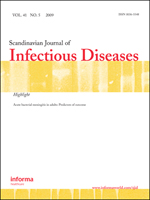 | |
| Discipline | Infectious disease |
|---|---|
| Language | English |
| Edited by | Rune Andersson |
| Publication details | |
Former name | Scandinavian Journal of Infectious Diseases |
| History | 1969–present |
| Publisher | Informa Healthcare (UK) |
| Frequency | Monthly |
| no | |
| 2.3 (2024) | |
| Standard abbreviations | |
| ISO 4 | Infect. Dis. |
| Indexing | |
| CODEN | SJIDB7 |
| ISSN | 0036-5548 (print) 1651-1980 (web) |
| LCCN | 80011540 |
| Links | |
Infectious Diseases (formerly Scandinavian Journal of Infectious Diseases) is a peer-reviewed medical journal publishing original research and review articles on clinical and microbiological aspects of infectious diseases.